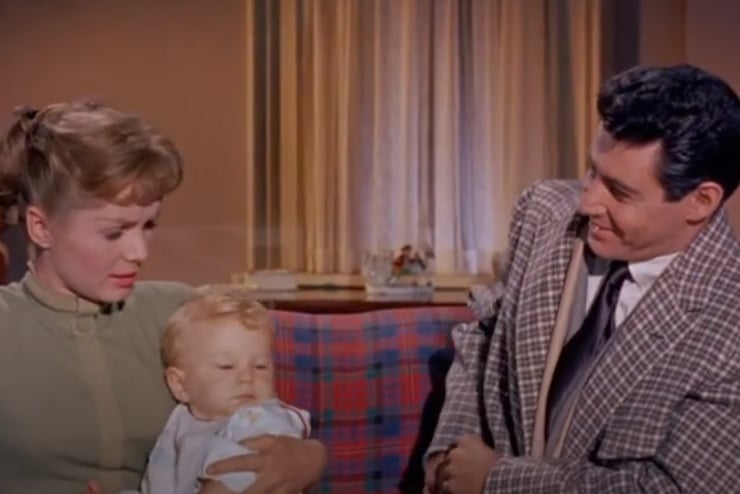Neither storks nor Santa Claus deliver babies, but the plot of Norman Taurog’s Technicolor comedy-musical Bundle of Joy (1956) in which Debbie Reynolds plays Polly Parish, who is mistaken for an out-of-wedlock single mother, would certainly have you believe they might. The story evokes another very unconventional birth, that of Jesus, and challenged the audience of its time to think more deeply about the true nature of Christian morality, even as it was packaged in a lighthearted story.
Parish is a clerk who works at J. B. Merlin and Son department store. She is newly hired and immediately becomes the top salesgirl, selling more hats than anyone else in the millinery department. She is called to see the owner, John Merlin (played by the incomparable Adolphe Menjou), thinking she will be commended for her selling abilities. Instead, Polly is fired for overselling the hats, the majority of which appear to be returned.
Despondent and desperate, Polly roams the streets of Manhattan, trying to find another job. While searching, she passes an orphanage and discovers a baby left on its doorstep. She picks the baby up, at which moment the door of the orphanage opens, and Polly is invited in. This is where the hilarious confusion begins.
The orphanage assumes that Polly is the real mother of the baby, and no matter how many times Polly denies it, she is dismissed. Upon discovering Polly has been fired, the orphanage makes an appeal to the store owner’s charity—who would leave a young, single mother without a job and a way to take her of her precious child?
Polly is then lavished with attention, particularly from John Merlin’s son, Dan (Eddie Fisher). The confusion about the true identity of the baby only intensifies when a rumor circulates that Dan Merlin is the father of the baby. Naturally, he denies his paternity, but things heat up when Polly invents a story about abuse from the father of the baby to explain away her newfound status as a single mother.
Dan’s father, John, then receives a letter from one of the disgruntled employees of his department store. The letter states that Dan is the father of the child, meaning John must be the grandfather. Instead of getting angry and possibly disowning his son for fathering a child out of wedlock, however, it turns out that John is ecstatic about becoming a grandfather. And as we might expect from a romantic comedy such as this, Polly and Dan slowly fall in love with one another, and the baby boy stays in the family.
In between the comical confusions, Debbie Reynolds and Eddie Fisher break into song and dance many times, singing alone or in a duet. At the time Bundle of Joy was made, Debbie Reynolds and Eddie Fisher were newly married. They were “America’s sweethearts,” and the film was a way to showcase the talents of both, as well as to exploit the fact that Reynolds and Fisher were the talk of the town. Although Fisher was a known singer, this was his first acting role.
At the time, Reynolds was also pregnant with their daughter, Carrie. This would explain her flowing coats in most scenes which were deployed to hide her own burgeoning maternity. Of course, it is ironic and sad that Reynolds and Fisher’s marriage ended almost immediately after Bundle of Joy was released. This was owing mainly to Fisher, who was then having an affair with Elizabeth Taylor. Hollywood never changes!
Still, despite the reality of the disintegration of the real-life marriage between Reynolds and Fisher, there is something sweet and comforting about this film, especially during the holiday season. Blending Technicolor with a comedy of errors, Bundle of Joy both continues and alters the tradition of American screwball comedies. Reynolds proves to be a great comedic actress—be it through physical comedy or facial expressions. Fisher’s talent clearly lies more in singing than acting but the pair’s love (however temporary) strengthens the film.
Reynolds’ acting demeanor and spirit are light, and though she is no pushover, there is a sense of feminine vulnerability and motherly stability within her. (Let us not forget how devastated Reynolds was at Carrie’s sudden death in 2016, so much so that she died from an intracerebral hemorrhage the very next day.)
One would think that when dealing with topics such as out-of-wedlock pregnancy, the Hollywood of the 1950s might have taken a different turn. One can easily imagine John Merlin set up to be a Scrooge-like character who refuses any “room at the inn” for the mother and the child. After all, wouldn’t Dan’s alleged paternity and abandonment, to say nothing of the rumored abuse, have brought shame to the family?
Yet, his reaction is quite the opposite as both life and love win out over any hint of scandal. John Merlin proves to be light of spirit, and immediately assumes that this means Dan will make things right, marry the girl, and extend his family. John’s deepest wish is that his son would stop being a playboy and settle down with a family and this news is like a gift to him. John’s selfishness (if we may even call it that) is one of abundance and a desire to share his joy. His longing for a grandchild, for life, in other words, transcends every other social consideration.
In this way, Bundle of Joy is a radical film that makes the use of Christmas joy to hold up the life-affirming and true love of a mother, father, and grandfather as both the pinnacle of Christian morality and the Christmas spirit. It is the fate of an abandoned child that matters most and the love he brings to the world that inspires all of us to be better people.

Leave a Reply